-
•
•
14 responses
The theologian is indispensible. She is the not-thoughtless. She takes no thought because she gives it. And the more she gives it away, the more it multiplies. Read More
-
•
•
11 responses
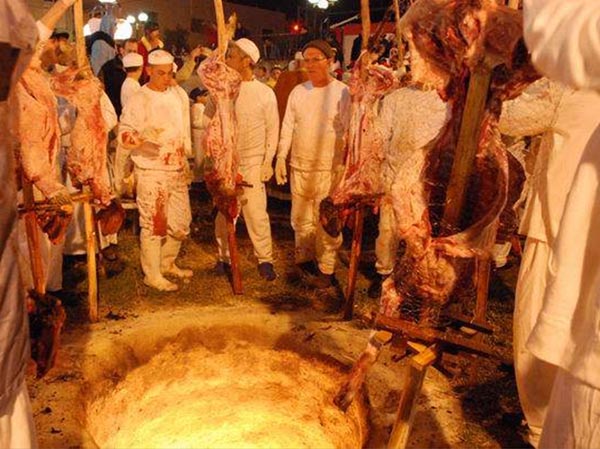
A recent CNN blog post referred to a “cult” and described their sacred rituals as “completely violent, mind controlling and alarming.” Indeed? Let’s examine. The worshippers gather together in the countryside, on the land of the leader’s extended family. He stands at an altar before them and shouts in a loud voice, reciting the strict and detailed requirements of the adherents which he claims (don’t they always claim this?) came from God, governing their eating habits, sexual habits, hygiene habits, even where they can live and whom they can marry. The worshippers chant their agreement in unison after each rule… Read More
-
•
•
77 responses
For those interested, Elder Dallin H. Oaks is testifying right now before the Senate Finance Committee on tax reform, specifically incentives for charitable giving. He is testifying at the request of Senator Hatch. Read More
-
•
•
18 responses
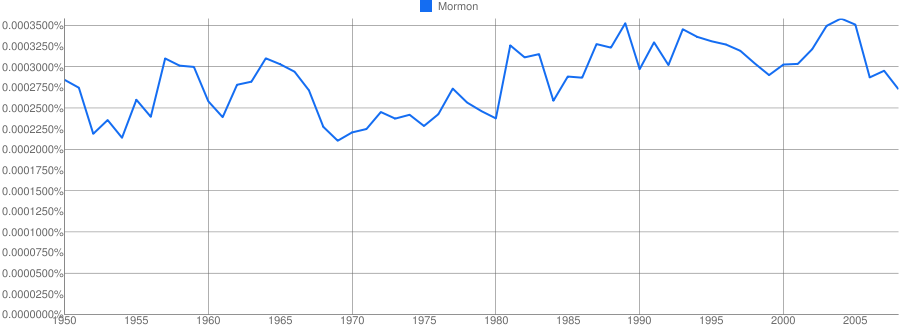
I’ve been looking at Google’s ngram viewer this weekend, at the instigation of my fellow blogger, Wilfried Decoo, and what I came across implies that the “Mormon Moment,” starting in this case with Mitt Romney’s first run for the presidency, may have had a larger impact in places outside of the U.S. than it has had in the U.S. Read More
-
•
•
30 responses
1. We admitted we were powerless over our theologies — that our thoughts had become unmanageable. Read More
-
•
•
103 responses

I wouldn’t be shocked if, in April’s General Conference, I were to hear a reference to “All the Single Ladies,” the cover story of this month’s Atlantic. In spite of its utter not-Mormonness, Kate Bolick’s article is oddly resonant of a strand of discourse we’ve been hearing in the Church for the last several years. In case you haven’t read the article,[fn1] a quick summary: the author finds herself still single at 39, in spite of having had plenty of relationships and in spite of the fact that she expected, at least for some portion of her life, to get… Read More
-
•
•
73 responses
As was mentioned in my introduction a week or so ago, my parents homeschooled us “back in the good old days when homeschooling was weird and subversive, not hip and progressive.” I’m now homeschooling my own children, and it’s interesting to note how the movement has evolved during the past 25 years. My adjectives describing the change don’t fit perfectly, of course, but they are representative of general trends, at least in how the perception of homeschooling has changed. When my mother decided she’d like to keep me home from kindergarten in 1985, it was a bizarre and scary thing… Read More
-
•
•
23 responses
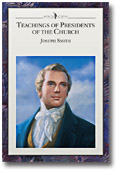
Following each General Conference I prepare a list of “Conference Books”—the works cited by speakers in the printed version of their talks. The list is always fascinating. But this time I noticed something that led me to rethink one aspect of the Church’s manuals: availability. Read More
-
•
•
17 responses
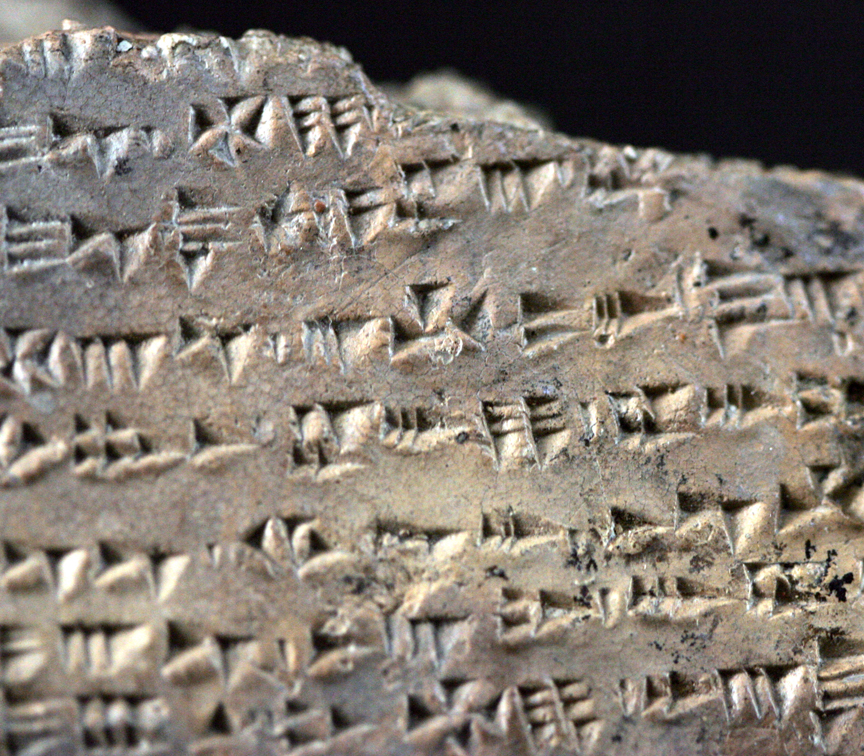
In Part 1, I promised some Biblical examples of where translation alone fails to convey all the meaning an Israelite would have grasped. I’ve broken these examples into three fuzzy categories. 1) Israel is often described in the Torah as a “land flowing with milk and honey.” We probably all have milk and honey in our kitchen, yet not quite what is described here. In the Old Testament, milk doesn’t usually come from cows, and honey doesn’t come from bees. Cattle were primarily used for beef, while milk came primarily from goats, only rarely from cattle. Israelites didn’t raise bees,… Read More
-
•
•
25 responses
I read Douglas Adams’ The Hitchhiker’s Guide to the Galaxy over the weekend for the first time since high school. I was glad to see that it’s a book that ages well. As a teenager I enjoyed it as a fun, imaginative science fiction romp. Now I appreciate it as a commentary on the absurdity of life and the immanence of death. (Speaking of which, this book fits in quite nicely with my previous post on Halloweeen. Hitchhiker’s Guide is definitely a Halloween classic, at least in the way I look at Halloween.) The story is essentially a series of unrelated… Read More
-
•
•
44 responses
“Give us this day, our daily bread, And forgive us our debts, as we forgive our debtors.” This is the prayer in my heart, the words my mind speaks each time I cut a slice of bread. I don’t bake bread every day, but all of the bread my family eats, I have baked. This is cause for gratitude. I am able to make bread, good bread, to feed my family. I am home enough to wait through the rises. I am strong enough to knead the dough. I have a reliable oven in which to bake, sunny warm spots… Read More
-
•
•
25 responses
My last year at BYU, I sat through an Elders Quorum lesson where the teacher discussed the etymology of “atonement.” I was skeptical that it actually derived from “at-one-ment,” and, immediately after church ended, I walked across campus to the Writing Center, keyed in my code, and pulled out the Center’s OED.[fn1] And, to my surprise, I learned that, although it looks suspiciously convenient, atonement does come from “at-one-ment.” Fast-forward a decade or more. I continue to be skeptical of stories that seem a little too pat and convenient, including Elder Cook’s story of the missionaries who didn’t board the… Read More
-
•
•
18 responses
I think I was 12 or so when, in rummaging around my father’s home office, I discovered the family genealogy. Over time I was hooked, visiting our local branch genealogy library and, when we visited Utah during a family vacation, I spent hours and days at the Genealogical Society library, then installed in the new Church Office Building, simply collecting the work that had already been done, copying family group sheet after family group sheet. All this was possible because, as the descendant of early Mormon pioneers, huge amounts of research on my ancestry has already been done. Read More
-
•
•
7 responses
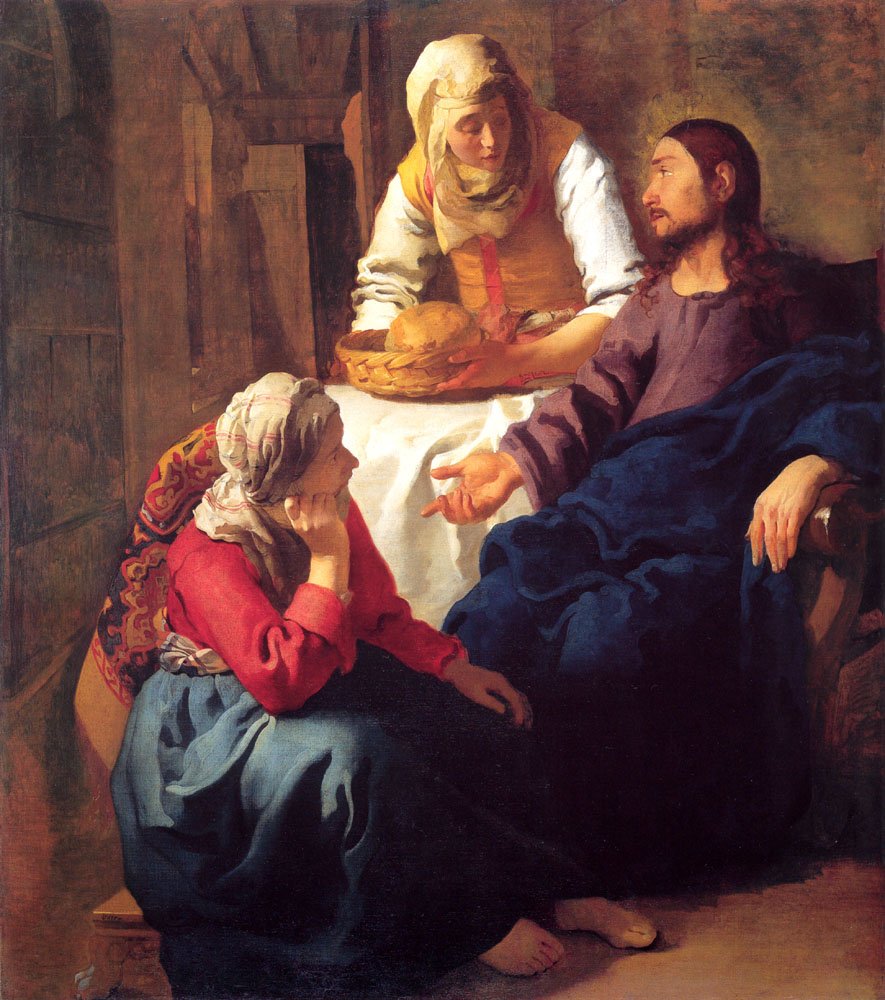
Having spent the past eight months in Tunisia, where our tiny L.D.S. group had very little formal structure, I had almost forgotten what it was like to go to a Church meeting without husband and children in tow. Attending the General Relief Society Meeting with a few friends was like a welcome home. I had found the new Daughters in My Kingdom book at my parents’ house when I arrived a few days before the General Relief Society Meeting, and somehow gotten the idea that it had come out months ago and was more or less required reading before the… Read More
-
•
•
61 responses
First of all, I want to be clear where I’m coming from. I would call myself a faithful member of the church. I pretty much go along with all the “orthodox” Mormon stuff. I’m not cafeteria. I’m not New Order. I’m stereotypical, boring, Happy Valley Mormon — except that I despise scrapbooking. Second of all, I think asking questions, searching for insight, and being uncomfortable with parts of Mormonism don’t make me, ipso facto, unfaithful. Nor do I think doing so is bad, wrong, or problematic. In case you haven’t noticed, I have problems with church gender issues and polygamy.… Read More
-
•
•
6 responses
We’re big fans of Rachel’s posts and comments, and so we’re awfully happy to announce that she is joining Times and Seasons as our newest permablogger. For anyone unfamiliar with her blogging, Rachel’s introduction can be found here, and her posts are here. Welcome to the group, Rachel! Read More
-
•
•
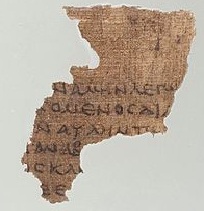
For a variety of reasons most New Testament scholars do not believe that this book was ever an actual letter written to a specific Christian congregation in Ephesus. For one thing, the words “to the Ephesians” in verse 1 is not part of the best manuscripts. Instead of a letter, it appears to be a treatise written as if it were a letter. A significant number of scholars, though perhaps not a majority, also question whether the book was written by Paul. As with Hebrews, for me the best response is that answering those questions doesn’t matter, though I assume… Read More
-
•
•
19 responses
For me, Christmastime starts around the end of September, with the first hints of autumn coolness. It extends through Halloween, Thanksgiving, Christmas, and New Year’s, and ends sometime around mid-February. My calendar looks something like this: Christmastime (September through February) The Wet & Cold Season (March through May) The Hot & Dry Season (June through August) Being yet the beginning of October, we’re still right around my new year. When the relentless Sacramento summer heat starts to withdraw and I need to roll my windows up for my morning commutes, I feel the stirrings of new life in me. I… Read More
-
•
•
13 responses
Times & Seasons is pleased to introduce Sarah Bringhurst Familia as our newest guest blogger. Sarah grew up in California, where she and her four siblings were homeschooled (back in the good old days when homeschooling was weird and subversive, not hip and progressive). She received her BA in Near Eastern Studies at BYU, and served a mission in Santiago, Chile. After their marriage and the birth of their first child, Sarah and her husband Tony took their two-month-old baby on a summer field study to the Philippines, where they slept in nipa huts, backpacked into mountain villages, and caught… Read More
-
•
•
32 responses

I should probably be responding to General Conference, given the timing and what I’ve been reading recently. And I still plan to respond to a couple of Conference issues. But the many recent news stories about Jobs has got me thinking about that instead. As I’ve pondered Jobs I think there is an important distinction that we are missing. Read More
-
•
•
13 responses
The first principles and ordinances in my life, borne of my experiences and observations, are these: Exposure, which leads to awareness, or, in other words, the knowledge of good and evil Awareness, which leads to gratitude and wonder Wonder, which leads to vision and discipline Discipline, which leads to understanding and becoming Understanding, which leads to humility and perspective Becoming and perspective, which lead to joy, which is sustainable happiness Sustainable happiness, which is the purpose of life They aren’t as concise as the 4th Article of Faith, but they work for me. Also, they are a work in progress.… Read More
-
•
•
67 responses
In his recent conference address, Elder Ballard emphasized that we must avoid the name “Mormon Church” and instead use as much as possible the official, full name of the Church. His message stems from two concerns: (1) the missing association with the name “Jesus Christ”, hence no immediate recognition of the Church as Christian. (2) the potential confusion with other groups, in particular polygamist groups, that are referred to as “Mormon.” Read More
-
•
•
89 responses
“We have noticed an unfortunate trend in church attendance. Despite thirty-plus years of formal equality, African-American members are still severely underrepresented in church attendance in the United States. In contrast, white church members are highly overrepresented. This may be because of differences in innate spirituality between the demographic groups. Or, it may be due to social forces. Regardless, it is a problem which must be addressed. Starting immediately and until further notice, all Priesthood leadership in the United States at the ward, stake, and general level will be drawn solely from African-American church members. This will provide additional incentive for… Read More
-
•
•
12 responses

On Sunday, as we luxuriated in General Conference (however we followed it), we missed an annual tradition: Pulpit Freedom Sunday.[fn1] A quick background on Pulpit Freedom Sunday: on July 2, 1954, Lyndon Johnson proposed that Section 501(c)(3) (the Internal Revenue Code section that exempts, among other things, churches, universities, and the NCAA from tax) be amended to prevent exempt organizations from campaigning on behalf of or against candidates for office. [fn2] There’s no legislative history, and, in fact, no record of the voice vote on the amendment. But it passed. Note, though, that the prohibition wasn’t particularly aimed at churches; in… Read More
-
•
•
109 responses
Mormons do care about the earth. We care about preserving, protecting, and maintaining it. We care about the earth because 1) We love God, 2) We care about other people, and 3) We believe in the intrinsic value of the earth. Read More
-
•
•
36 responses
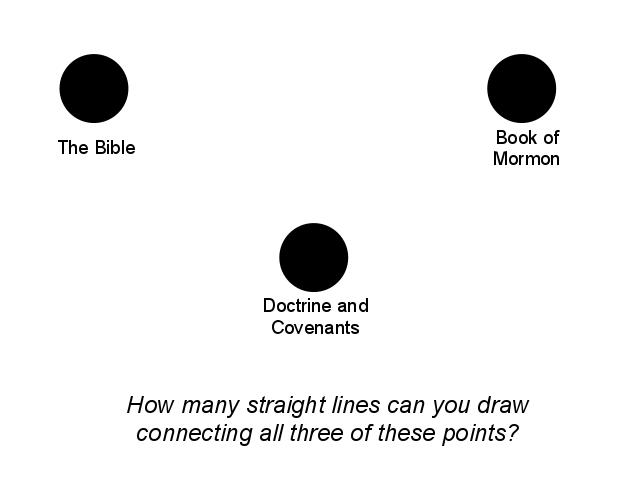
Elder Perry’s Saturday conference address focused on how we present ourselves and how we are perceived by others. Religious affiliation affects how we perceive others. For example, when I lived in Oregon it wasn’t uncommon to see the little “Christian fish” on business storefronts. (I see this occasionally in California, but not nearly so frequently.) At first, this was a value-neutral statement in my mind. I was just as happy to frequent a business as a non- business. However, my experiences with the businesses were subpar, and I came to associate the as indicating, “We’re not as good as the… Read More
-
•
•
78 responses
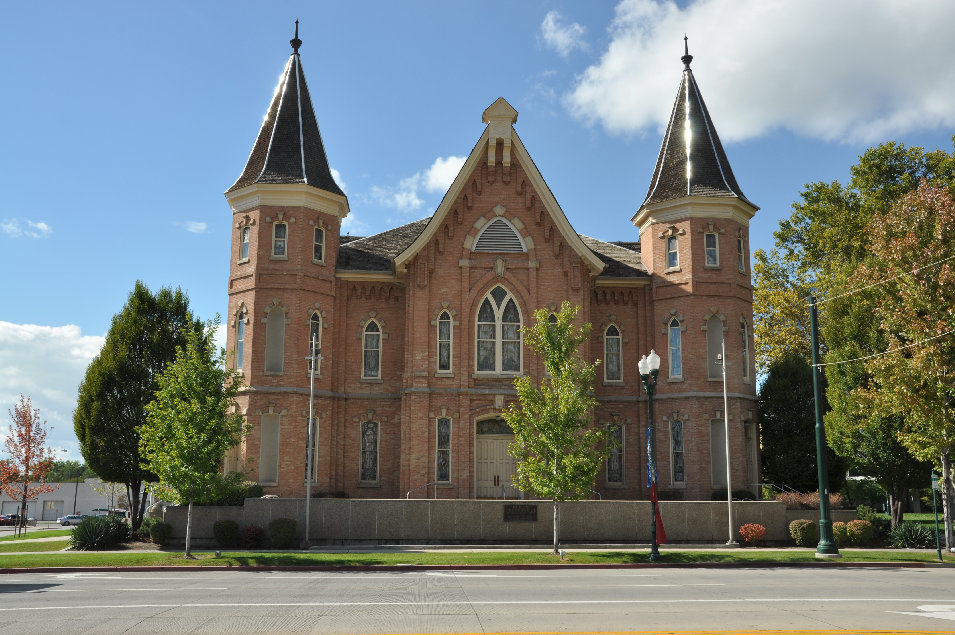
With the announcement today that the Provo Tabernacle will be reconstructed and made into a Temple, I wondered what its official name will be? Or in other words, how will its name be different from the other Provo Utah Temple? Read More
-
•
•
81 responses
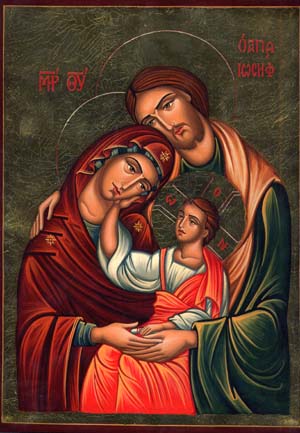
My Wife’s Exercise of the Priesthood in Our Home (or Response to Alison part III) Here a people of godly race are born for heaven; the Spirit gives them life in the fertile waters. The Church-Mother, in these waves, bears her children like virginal fruit she has conceived by the Holy Spirit.[1] I love this inscription. For me, it makes of baptism the center of a multi-axes union of male and female, convert and community, earth and heaven – reminiscent of our earlier discussions, and a perfect preamble to this one. (Actually, the preamble’s going to on for a while… Read More
-
•
•
42 responses
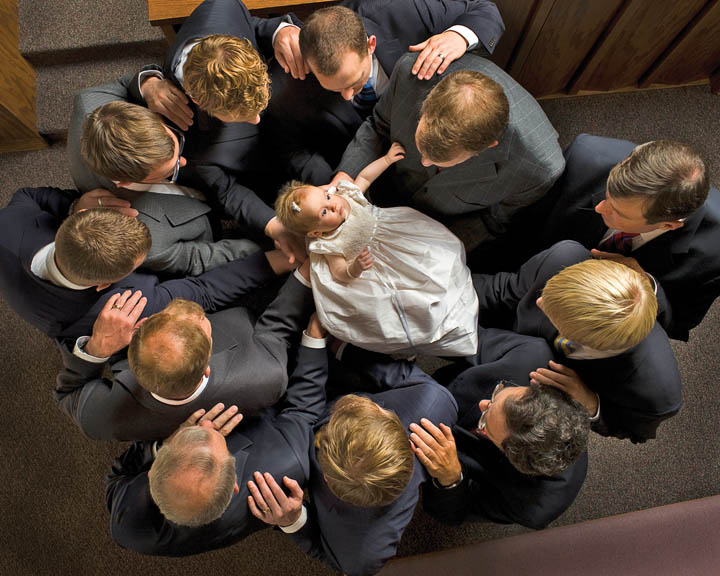
Why is it that when blessing infants men always bounce the baby up and down? If you’ve seen many baby blessings, you know what I mean. The father or whoever will pronounce the blessing holds the infant on its back in his outstretched hands while the rest of those invited to participate circle the child, adding their outstretched hands underneath the baby. Often before the blessing even begins and without regard to whether or not the child has uttered the merest hint of a whimper, the men slowly rock the baby up and down, usually gently. Read More

